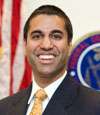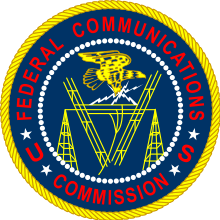Ajit Varadaraj Pai
| Ajit Varadaraj Pai | |
|---|---|
 | |
| Federal Communications Commissioner | |
| President | Barack Obama |
|
Assumed office May 14, 2012 | |
| Personal details | |
| Born |
January 10, 1973 Buffalo, New York, U.S. |
| Political party | Republican |
| Spouse(s) | Janine Van Lancker |
| Children |
|
| Parents | Radha and Varadaraj Pai |
| Residence | Arlington, Virginia |
| Alma mater | University of Chicago, J.D. |
| Profession | lawyer |
| [1][2][3] | |
Ajit Varadaraj Pai (born January 10, 1973) is a Commissioner at the United States Federal Communications Commission (FCC). He was nominated for a Republican Party position on the commission by President Barack Obama at the recommendation of Mitch McConnell. He was confirmed unanimously by the United States Senate on May 7, 2012, and was sworn in on May 14, 2012, for a term that concludes on June 30, 2016. Pai previously worked as a lawyer for Verizon Communications.
Early life and education
The son of immigrants from India, Pai was born on January 10, 1973 in Buffalo, New York. He grew up in rural Parsons, Kansas.[4] Both of his parents were doctors at the county hospital.[2][5]
Pai attended Harvard University where he participated in the Harvard Speech & Parliamentary Debate Society.[6] He earned a B.A. with honors in Social Studies from Harvard in 1994 and a J.D. from the University of Chicago in 1997, where he was an editor of the University of Chicago Law Review and won the Thomas J. Mulroy Prize.
Career
Following law school, Pai clerked for Martin Leach-Cross Feldman of the United States District Court for the Eastern District of Louisiana.[1] After moving to Washington, DC in 1998, Pai worked for the United States Department of Justice’s Antitrust Division as an Honors Program trial attorney on the Telecommunications Task Force. There, he worked on proposed mergers and acquisitions and on novel requests for regulatory relief following the enactment of the Telecommunications Act of 1996.
Pai left his Department of Justice post in February 2001 to serve as Associate General Counsel at Verizon Communications Inc., where he handled competition matters, regulatory issues, and counseling of business units on broadband initiatives.[1]
Pai left Verizon in April 2003 and was hired as Deputy Chief Counsel to the United States Senate Judiciary Committee’s Subcommittee on Administrative Oversight and the Courts. He returned to the Department of Justice to serve as Senior Counsel in the Office of Legal Policy in May 2004. He held that position until February 2005, when he was hired as Chief Counsel to the Subcommittee on the Constitution, Civil Rights, and Property Rights.
Between 2007 and 2011, Pai held several positions in the FCC's Office of General Counsel, serving most prominently as Deputy General Counsel. In this role, he had supervisory responsibility over several dozen lawyers in the Administrative Law Division and worked on a wide variety of regulatory and transactional matters involving the wireless, wireline, cable, Internet, media, and satellite industries.[1] In 2010, Pai was one of 55 individuals nationwide chosen for the 2011 Marshall Memorial Fellowship, a leadership development initiative of the German Marshall Fund of the United States.[1] Pai returned to the private sector in April 2011, working in the Washington, D.C. office of law firm Jenner & Block where he was a Partner in the Communications Practice.
In 2011, Pai was then nominated for a Republican Party position on the Federal Communications Commission by President Barack Obama at the recommendation of Minority leader Mitch McConnell. He was confirmed unanimously by the United States Senate on May 7, 2012 and was sworn in on May 14, 2012 for a term that concludes on June 30, 2016.[1]
Policy positions
Pai has been an advocate for free market positions during his tenure on the FCC, emphasizing in testimony before Congress that "The Internet is the greatest example of free-market innovation in history.".[7] In addition, Pai is seen as a closer ally to broadcasters than other members of the FCC.[8] In testimony before the U.S. House of Representatives Energy and Commerce Committee’s Subcommittee on Communications and Technology on July 10, 2012, he warned about the dangers of regulatory uncertainty and the need for the FCC to keep pace with the dynamic communications sector.[9] Pai also asserted that by reforming the way the Commission works, the agency can facilitate the provision of new and better services at lower prices for American consumers.[9]
Pai gave his first major speech since taking office on July 18, 2012 at Carnegie Mellon University in Pittsburgh, Pennsylvania. There, he discussed how the FCC can help promote economic growth and enhance job creation in the information and communications technology field[10] by adhering to three basic principles: (1) the FCC should be as nimble as the industry it oversees; (2) the FCC should prioritize the removal of regulatory barriers to infrastructure investment; and (3) the FCC should accelerate its efforts to allocate additional spectrum for mobile broadband.[11] Specifically, he called for a reinvigoration of Section 7 of the Communications Act, which gives the Commission a one-year deadline to review proposals for new technologies and services. He introduced the idea of creating an IP Transition Task Force to expedite the country’s transition to all-IP networks and to ensure that new network infrastructure will not be subject to outdated, monopoly-era regulations. He urged the commission to settle the nine-year-old contributions reform proceeding for the Universal Service Fund by the end of the year. Finally, he advocated for completing the rules for the AWS-4 spectrum band by September 2012 and conducting the broadcast spectrum incentive auctions by June 30, 2014.[11]
Pai wrote an op-ed for The Wall Street Journal in 2014 criticizing a proposed FCC study of the news-gathering practices of media organizations.[12][13] In another 2014 letter, Pai criticized Netflix, writing that their Open Connect caching tools effectively secure fast lanes for its traffic.[14]
Net neutrality
Pai is opposed to the FCC's current incarnation of net neutrality and voted against reclassifying internet service providers as Title II Common Carriers. He was very active publicly opposing the early-2015 vote of the FCC to enact net neutrality regulations.[15]
Prison inmate telephone calling costs
Pai voted to oppose imposing caps on the rates private companies charge for interstate inmate phone calls in 2013,[16] arguing instead for a simpler rate limit.[17] In 2015, Pai opposed rate caps on in-state inmate calls, claiming it would not solve the problem of inmates' contraband cell phones.[18]
Personal life
Pai lives in Arlington, Virginia with his wife and two children.[1][2]
References
- 1 2 3 4 5 6 7 "Commissioner Ajit Pai". FCC.gov. Retrieved 2013-12-30.
- 1 2 3 "NOMINATIONS OF JESSICA ROSENWORCEL AND AJIT PAI TO THE FEDERAL COMMUNICATIONS COMMISSION". Committee on Commerce, Science, and Transportation. November 30, 2011. S. Hrg. 112-480. Retrieved 2013-12-30.
- ↑ Byers, Alex (October 18, 2013). "Congress gets back to what? — Ohlhausen on 'Internet of things' — What to know about Jeh Johnson — FCC reschedules Oct. meeting". Politico. Retrieved 2013-12-30.
At least one good thing happened during the last two weeks — the birth of Annabelle Malathi Pai, the second child of FCC Commissioner Ajit Pai and his wife Janine Van Lancker. Annabelle was born Oct. 11.
- ↑ Eggerton, John (September 10, 2012). "Minority report: in his first extensive interview as the FCC's new GOP commissioner, Ajit Pai explains why government should get out of the way of innovation" (fee, via Fairfax County Public Library). Broadcasting & Cable. pp. 16+. Gale Document Number: GALE|A310650911. Retrieved 2013-12-30. Biography in Context. (subscription required)
- ↑ "Provider Search Results". Labette Health. Retrieved 2013-12-30.
Pai, Radha, M.D. Anesthesiology ... Pai, V.S., M.D. Urology
- ↑ "Our Distinguished Alumni". Harvard Speech & Parliamentary Debate Society. Retrieved 2013-12-30.
- ↑ "Testimony of Ajit Pai Before House Energy & Commerce Committee, March 19, 2005" (PDF).
- ↑ Flint, Joe (May 5, 2014). "FCC Commissioner Ajit Pai seeks peace with broadcasters". Los Angeles Times.
- 1 2 "Testimony of Commissioner Ajit Pai, Hearing on Oversight of the Federal Communications Commission" (PDF). Retrieved July 10, 2012.
- ↑ "Unlocking Investment and Innovation in the Digital Age:The Path to a 21st-Century FCC" (PDF). Retrieved July 18, 2012.
- 1 2 "New FCC member wants nimble agency". Retrieved July 18, 2012.
- ↑ Farhi, Paul (February 20, 2014). "Proposed FCC study of news organizations sparks conservative outcry". Washington Post.
- ↑ "The FCC Wades into the Newsroom". The Wall Street Journal. Retrieved March 3, 2014.
- ↑ Wilhelm, Alex (December 11, 2014). "Netflix Fires Back At FCC Commish Pai's Allegation That It Is Building Internet Fast Lanes For Its Own Content". TechCrunch.
- ↑ http://www.politico.com/story/2015/02/pai-embraces-chief-critic-role-on-net-neutrality-115298.html
- ↑ http://thehill.com/policy/technology/316371-fcc-limits-price-of-prison-phone-calls
- ↑ transition.fcc.gov/Daily_Releases/Daily_Business/2013/db0809/DOC-322749A4.pdf
- ↑ https://www.washingtonpost.com/news/the-switch/wp/2015/10/22/calling-a-prison-inmate-can-cost-54-a-pop-the-fcc-thinks-thats-way-too-high/
